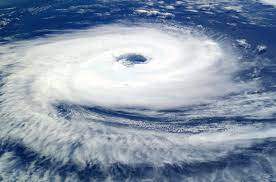
UNDATED – The World Meteorological Organization’s Hurricane Committee has retired Dorian (2019) and Laura, Eta, and Lota (2020) from the rotating lists of Atlantic tropical cyclone names because of the death and destruction they caused.

It also decided that the Greek alphabet will not be used in the future because it creates a distraction from the communication of hazard and storm warnings and is potentially confusing.
The annual name list has been exhausted on two occasions during the past 15 years, and it is likely that this will occur again in the future.
Hurricane Committee members agreed to create a supplemental list of names A-Z (excluding Q, U, as well as X, Y, and Z on the Atlantic list) that would be used in lieu of the Greek alphabet when the standard list is exhausted in a given season. Names on this list could be retired and replaced, when required. Names beginning with Q, U, X, Y, and Z are still not common enough or easily understood in local languages to be slotted into the rotating lists.
A supplemental list of Atlantic tropical cyclone names in lieu of using the Greek Alphabet was agreed by the committee:
| Atlantic tropical cyclone names | Pacific tropical cyclone names |
| Adria | Aidan |
| Braylen | Bruna |
| Caridad | Carmelo |
| Deshawn | Daniella |
| Emery | Esteban |
| Foster | Flor |
| Gemma | Gerardo |
| Heath | Hedda |
| Isla | Izzy |
| Jacobus | Jacinta |
| Kenzie | Kenito |
| Lucio | Luna |
| Makayla | Marina |
| Nolan | Nancy |
| Orlanda | Ovidio |
| Pax | Pia |
| Ronin | Rey |
| Sophie | Skylar |
| Tayshaun | Teo |
| Viviana | Violeta |
| Will | Wilfredo |
| Xinia | |
| Yariel | |
| Zoe |
The 2020 season got off to an early and rapid start with a record nine named storms from May through July. It ended late, with two major hurricanes in November for the first time on record and at a time when the season is normally winding down. The season was so active that WMO’s 21-name rotating list was exhausted and the Greek alphabet was used for only the second time (the first time was in 2005).
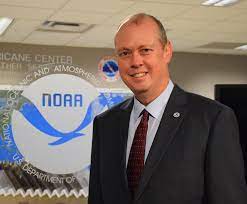
“The RA-IV Hurricane Committee’s work is critical to keep our nations coordinated well before the next storm threatens”, said Ken Graham, Hurricane Committee Chair and National Hurricane Center Director. “Hurricanes don’t care about international boundaries. We all face similar dangers from tropical systems. Impacts from a single storm can affect multiple countries, so it is critical we have a plan, coordinate our efforts, and share challenges and best practices”.
Although the naming convention is only a small part of the Hurricane Committee’s life-saving work, it attracts the most public attention. Atlantic tropical cyclone name lists repeat every six years unless a storm is so deadly or costly that its name is retired from future lists.
In total, 93 names have now been retired from the Atlantic basin list since 1953, when storms began to be named under the current system.
The Hurricane Committee agreed on the retirement of names from 2020, along with 2019, because this was not on the agenda of last year’s Hurricane Committee due to the unfolding COVID-19 crisis.

“Developing countries and small islands in the Caribbean and Central America are increasingly vulnerable to the impacts of tropical cyclones, which can overturn years of socio-economic development in a matter of hours. In 2020, we saw this once again with tragic effect,” says Evan Thompson, President of WMO’s Regional Association for North America, Central America, and the Caribbean.
“We cannot prevent this incredible force of nature, but we do have the power to minimize the loss of life and property through cutting-edge forecasts and warnings and strong regional coordination and cooperation,” said Thompson, who head’s Jamaica’s national meteorological service.
The Atlantic Hurricane Season officially begins on June 1 and many forecasters are predicting another active year in the tropics.
The 2020 hurricane season was no doubt one of the strongest on record.
2019 – Dorian
Dorian was a Category 5 hurricane (on the Saffir-Simpson Hurricane Wind Scale) and the strongest hurricane to hit the northwestern Bahamas in modern records.
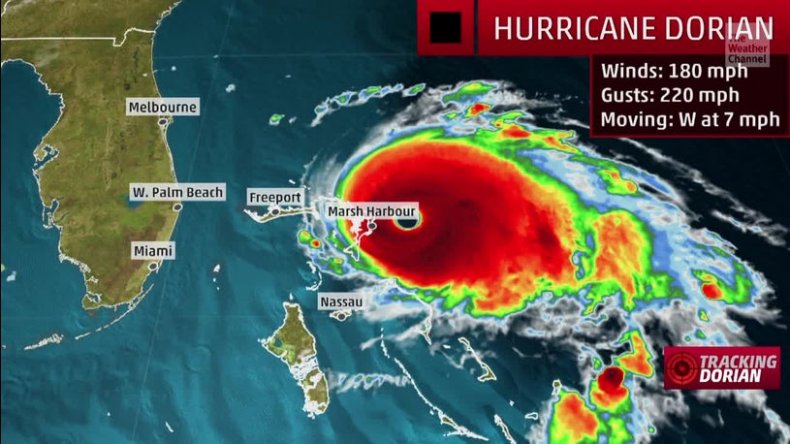
Dorian caused catastrophic damage mainly in Abaco and eastern Grand Bahama Islands with total damage estimated at $3.4 billion (USD). More than 75 percent of all homes on the island were damaged. The Inter-American Development Bank (IDB), an agency which the government of the Bahamas asked to conduct a study following Dorian’s trail of destruction, stated that the hurricane left 29,500 people homeless and/or jobless.
Dexter will replace Dorian on the list of names in 2025.
2020 – Laura
Laura was a powerful category 4 hurricane (on the Saffir-Simpson Hurricane Wind Scale) that made landfall near Cameron, Louisiana, accompanied by a devastating storm surge of at least 5 meters (17 feet) above ground level.
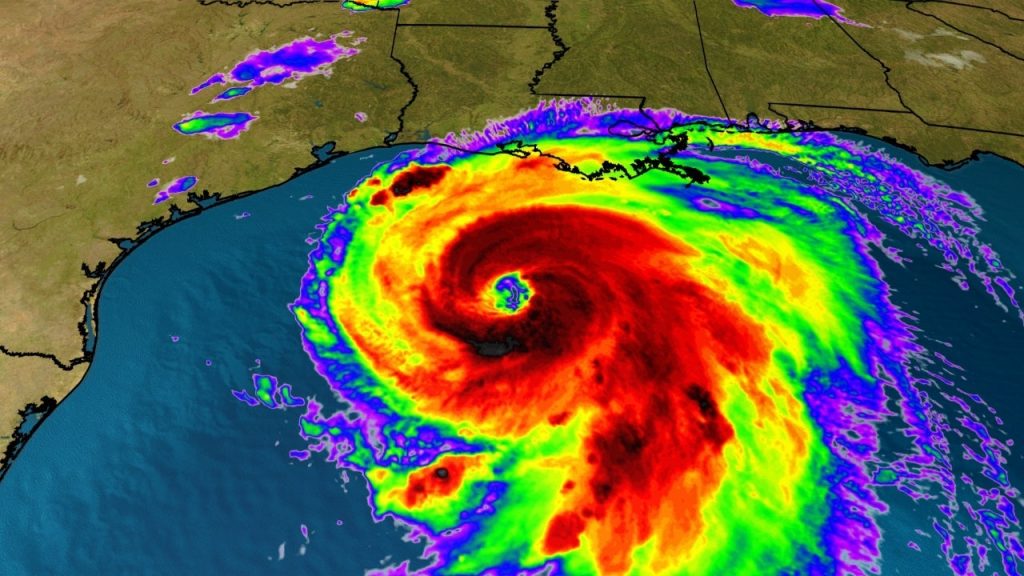
It was responsible for 47 direct deaths in the United States and Hispaniola, and more than $19 billion in damage.
Leah will replace Laura on the list of names in 2026.
2020 – Eta & Iota
Hurricanes Eta and Iota both made landfall less than two weeks apart during November 2020 in the same area of the Nicaraguan coast just south of Puerto Cabezas.
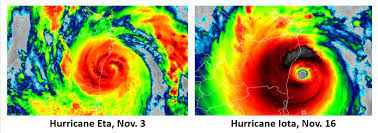
The two powerful tropical cyclones caused extensive flooding in Nicaragua, Honduras, and other adjacent Central American countries, resulting in at least 272 fatalities and damage losses of more than $9 billion.
Information, World Meteorological Organization



